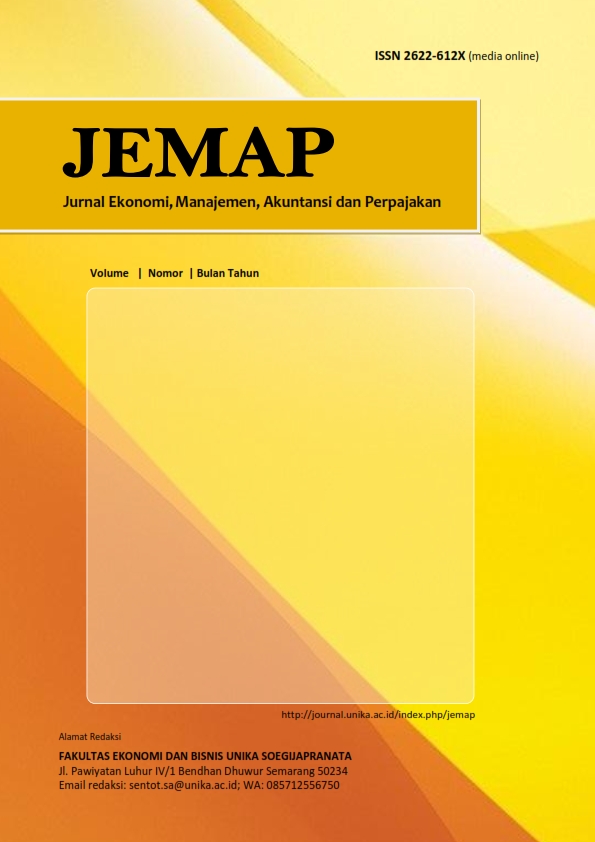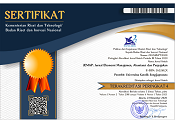Pengaruh Opinion Leader Terhadap Persepsi Tingkat Kepercayaan Merek Asing
Abstract
The purpose of this research wanted to know about the influence of opinion leader towards the belief level of foreign brand, especially neurotropic vitamin. The data was gained from 186 responden by questionnaires and interview. Sampling method used was non probability sampling and the purposive technique to select respondents engaging health care professionals including nurse, midwife and general practicioners. Simple regression was used to exam the data. There was an influence of opinion leader on the belief level of foreign brand perception showed by t-count value (4.096) which was greater than t-table (1.973). It was concluded that individuals prefer the advice received from an experienced and knowledgeable advisor more than less skilled and less experienced advisor.
Keywords
Full Text:
PDF (Bahasa Indonesia)References
Arikunto (2006). Prosedur penelitian suatu pendekatan praktek, Jakarta: PT.Rineka Cipta
Barney, J., & Hansen, M. (1994). Trustworthiness as a source of competitive advantage, Strategic Management Journal, 15, 175-190.
Batra et al (2000). Effects of brand local and non local origin on consumer attitudes in developing countries. Journal of Consumer Psychology, 9(2). 83-95.
Berkman, Harold W and Christopher Gilson (1986). Consumer behavior: Concepts and strategies. 3rd edition. Boston: Kent Publishing Company.
Delgado-Balester, Elena dan Jose Luis Munuera-Aleman (2002). Development and validation of a brand trust scale across product categories: A confirmatory and multigroup invariance analysis. American Marketing Association-Conference Proceedings. Vol.13
Feng, B., & MacGeorge, E. L. (2010). The influences of message and source factors on advice outcomes. Communication Research, 37(4), 553–575. https://doi.org/10.1177/0093650210368258
Grubor, A., & Milovanov, O. (2017). Brand strategies in the era of sustainability. Interdisciplinary Description of Complex Systems, 15(1), 78–88. https://doi.org/10.7906/indecs.15.1.6
IPMG-International Pharmauceticals Manufacturers Good online.com (2019).Rev.September. Jakarta
Johannson & Ronkainen (2005). The esteem of global brands. Brand Management, 12(5)
Merck National Conference, January 2009
Morgan, R. M., & Hunt, S. D. (1994). The commitment-trust theory of relationship marketing. Journal of Marketing, 58(3), 20. https://doi.org/10.2307/1252308
Ozsomer (2012). The interplay between global and local brands: A closer look at perceived brands globalness and local iconess. Journal of International Marketing
Ozsomer & Altaras (2008).Global brand purchase likelihood: a critical syntesis and an integrated conceptual framework, Journal of International Marketing, 16 (4) 1-28
Pratiwi, A. E., Hakim, M. S., & Rahmawati, Y. (2017). Identifikasi opinion leader di kalangan mahasiswa untuk produk laptop. Jurnal Sains Dan Seni ITS, 6(2), 176–179. https://doi.org/10.12962/j23373520.v6i2.24372
Rondonuwu. (2018). Peranan opinion leader dalam menyampaikan pesan tentang pembangunan desa di desa lantung kecamatan wori kabupaten minahasa utara. Jurnal Administrasi Publik, 3(45), 1–7.
Riduwan (2005). Skala pengukuran variabel penelitian. Bandung: Alfabeta
Sugiyono (2016). Metode penelitian kuantitatif, kualitatif dan R & D. Bandung: Penerbit Alfabeta.
Valente, T. W., & Davis, R. L. (1999). Accelerating the diffusion of innovations using opinion leaders. The Annals of the American Academy of Political and Social Science, 566(1), 55–67. https://doi.org/10.1177/000271629956600105
Valverde, J. L. (2012). Editorial: Ethical challenges in the pharmaceutical industry. Pharmaceuticals Policy and Law, 14(2–4), 123–127. https://doi.org/10.3233/PPL-120349
Yip, George, S. (1995). Total global strategy: Managing for worldwide competitive advantage. Upper Saddle River, NJ: Prentice Hall
DOI: https://doi.org/10.24167/jemap.v4i2.3298
Refbacks
- There are currently no refbacks.
e-ISSN 2622-612X | View My Stats







